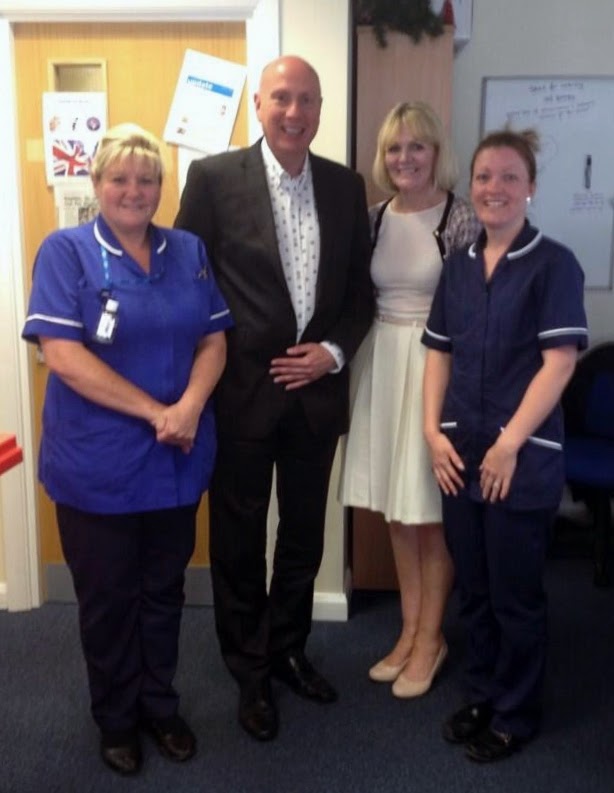I mention Bury’s well-known tourist attractions such as the World Famous Market because people travel far and wide to visit. Yet when we mention examples of healthcare worth travelling to see, Sweden or USA are often mentioned, but not Bury.
Well, I spent an inspirational afternoon with the Bury Community Stroke Team, managed by Lisa and led by Jo, and it was well worth the short journey up the M66. As much as I’d welcome a visit to Jönköping or Boston, the Bury Community Stroke Team show we can reach for world class care here in the UK!
The service is a great example of where commissioners and providers have come together to do the right thing for patients - improve care pathways and empower people to manage their own healthcare needs.
Whenever I read about healthcare, plan strategy or visit services, I look for a number of things - a well-led service, clear operational plans and specifications, the promotion of self-care, whole person care and the holy grail of good physical and mental health care combined.
If I had been playing community stroke service Bingo (that well known pastime!) I would have been shouting ‘house’ after thirty minutes of Jo and her team describing their service:
- Did they measure outcomes that could be part of an overall indicator of performance to demonstrate value? Tick - they use EQ5D5L, something I hadn’t known about but understand other community services uses also. Excellent.
- Do they promote self-care? Tick - they are running a self-care course and are also developing modules to be run through the Trust's Living Well Academy.
- Technology? Tick – they use Healthtalkonline and Speech and Language Therapists use apps to help people following a stroke.
- What about the psychological aspects of the community care pathway for stroke? Tick - The team has worked with the Bury psychological therapies team to develop the psychological offer in the overall care pathway. They are now trained in Brief Solution Focused Therapy and Motivational Interviewing and speak positively about whole person care.
As I said I was inspired and it was a perfect example of how Trusts like Pennine Care are well placed to provide whole person care to our patients.
I can’t do justice to how impressive this team really is. It’s early days and they are still building the data to measure overall performance, but all the core ingredients are there to deliver a world class service. The team should be rightly proud of themselves and commissioners congratulated for attending to the out of hospital care needs on the stroke pathway.
District nursing visit
A few days later and I was back in Bury. I know there are great quality bargains to be grabbed on the market but I didn’t have time to stop unfortunately, as I was visiting one of the district nursing teams for work. Although I’m not sure having the privilege to spend time with dedicated, skilled, professional nurses can really be described as work.I spent the morning with Sian, Vicky, Karen and Jo talking about the challenges faced in district nursing services. I was fortunate to shadow Karen carrying out her clinical duties and talking to her reminded me how complex and demanding the district nursing role is.
In my last blog, I talked about polarities and managing change and within Pennine Care we have recently carried out a district nursing review, involving nurses from all of our boroughs.
We and system leaders up and down England mustn’t forget that district nurses are busy, skilled professionals who carry out complex, difficult and demanding work.
As hospitals try to move care outside of hospital and GPs look for support to high levels of demands, where does the care go? Into community services and often to the district nurse. They can rarely say no to demands, go about their hard work effectively (but often quietly) and make a huge difference to the lives of people who need their care.
The community models of care, especially district nursing, need dedicated thought leadership, investment of time and resources to develop models and an understanding that a district nursing team has the same floors and ceilings of capacity as a ward does.
We talk about hard truths for ward staffing levels, which I fully agree with, but it isn’t just wards that have to be safely and effectively staffed, so does the community.
It was a real pleasure to spend time with such a hard working team, not short on ideas on what they feel needs to be done. But I think the NHS system needs to listen more to their voice and not overlook the community filling in the sandwich between primary care and hospitals.



I cannot praise the team on the stroke ward highly enough. My 93 year old mother in law was recently admitted to the stroke ward in Bury and due to the excellent care she received there she is on the way to a full recovery. Thank you all
ReplyDelete